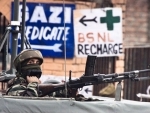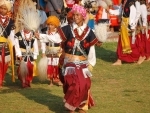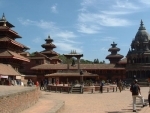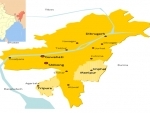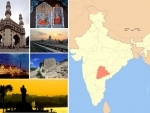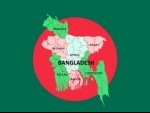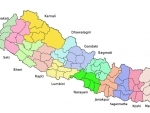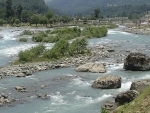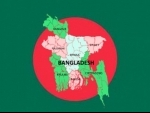Research Associate, Institute for Conflict Management On May 26, a person identified as Ghulam Hassan Dar was killed by unidentified gunmen in Sopore Town of Baramulla District. Dar was the father of a sarpanch [head of panchayat, village level self-government institution] who had an Aircel mobile transmission tower installed inside his residential compound.
Islamic State: Lurking Dangers
Research Fellow, Institute for Conflict Management After nearly six months of investigation in a case related to the Islamic State of Iraq and Levant [ISIL, later, the Islamic State (IS)], the National Investigation Agency (NIA), filed a charge sheet on May 20, 2015, before the NIA Special Court in Mumbai. According to the Agency,
Meghalaya: Continuing Irritants
Research Assistant, Institute for Conflict Management On May 7, 2015, Security Forces (SFs) killed a suspected Garo National Liberation Army (GNLA) militant, identified as 'lieutenant' Sanjay alias Gobat Gambat, in the Tapa Darengchi area of North Garo Hills District. One pistol was recovered from the incident site.
Research Associate, Institute for Conflict Management On March 30, 2015, 41 people including 35 cadres of Unified Communist Party of Nepal-Maoist (UCPN-M)-led 30-party alliance, five Policemen and one minor were injured in clashes between Police and demonstrators during the lathi (baton) rally organized by the alliance across the country against attempts to draft the Constitution through the majority voting process, instead of consensus.
Northeast: The Troubles Endure
Research Assistant, Institute for Conflict Management Insurgencies in India's Northeast have seen repeated cycles of reverses and resurgence. Most States in the region remain poorly governed and, on a wide range of parameters. The recent conflagrations in Assam have demonstrated clearly that, however significant the gains of the state in a particular theatre, there is no space for the pattern of administrative incompetence, political corruption and neglect that has characterized governance in the Northeast - and, increasingly, much of India as well. The enemy waits, close at hand. SAIR Volume 11, No. 34, February 25, 2013.
Research Associate, Institute for Conflict Management After a protracted political slug fest and acrimonious protests, the new State of Telangana was created on June 2, 2014, bifurcating Andhra Pradesh. According to the arrangement, Hyderabad will remain the joint capital for both the States for ten years, after which Andhra Pradesh will have its own capital and Hyderabad will be transferred entirely to Telangana. While Telangana has 10 Districts, the residuary Andhra Pradesh has 13. Interestingly, even as the undivided Andhra Pradesh successfully broke the backbone of Maoist movement in the State, the Maoists managed retain a shadow of their presence in the State. That shadow remains visible in Telangana.
Research Associate, Institute for Conflict Management On March 4, 2015, Shipon Mia (30), a driver was burnt to death and his assistant Shakil Ahmed (15) suffered serious burn injuries, when supporters of the Bangladesh Nationalist Party (BNP)-led 20-party alliance's blockade programme hurled a petrol bomb at their pick-up van in the Shibganj area of Chapainawabganj District.
Research Fellow, Institute for Conflict Management On February 18, 2015, at least four Shias were killed and another six were injured in a suicide attack during evening prayers at a mosque inside Qasr-e-SakinaImambargah (Shia place of worship) located on Kurri Road in the New Shakrial area of Rawalpindi District in Punjab. Police sources stated that the suicide bomber opened fire before trying to enter the mosque. When challenged by guards deployed at the Imambargah, the attacker attempted to detonate his explosive vest, but failed to do so. The explosive vest was diffused later. Fahad Marwat, a 'spokesman' of Jundullah, a splinter group of Tehreek-e-Taliban Pakistan (TTP), claiming responsibility for the attack, declared that the blast was in a reaction to the ongoing operation Zarb-e-Azb [Sword of the Prophet] in the North Waziristan Agency of Federally Administered Tribal Areas (FATA).
KP: Declining Violence, Increasing Threat
Research Associate, Institute for Conflict Management At least 22 Shias were killed and another 50 were injured when a three member suicide squad attacked an Imambargah (Shia place of worship) in the Phase-5 locality of the Hayatabad area in Peshawar, the provincial capital of Khyber Pakhtunkhwa (KP), on February 13, 2015. As the entrance of the Imambargah is heavily guarded, the terrorists dressed in Police uniforms entered the Imambargahfrom the other side of the mosque, cutting through barbed wire, and carried out the attack when around 800 worshippers were offering Friday prayers. Of the three suicide bombers who entered the mosque, only one was able to blow himself up. A second was killed by Security Force (SF) personnel, while the third was arrested in an injured condition.
Research Fellow, Institute for Conflict Management The environment of peace that had been established in Nepal in 2013 survived, despite challenges, through 2014, with not a single insurgency-related fatality on record. Significantly, since March 2000, when the South Asia Terrorism Portal (SATP) database commenced compiling data on insurgency-related fatalities in Nepal, it was in 2013 that the Himalayan Nation did not record a single insurgency-related fatality during the course of a year, for the first time, and remained completely free of insurgency-related violence. At its peak in 2002, the insurgency saw 4,896 persons, including 3,992 Maoists, 666 Security Force (SF) personnel and 238 civilians, killed in a single year.
Research Assistant, Institute for Conflict Management ...Violence in Karachi has become so commonplace that reports of ever more gruesome excesses against the citizens are usually taken in the stride...
Balochistan: Persistent Crisis
Research Associate, Institute for Conflict Management The Security Forces (SFs) recovered three bullet-riddled bodies from Mand area of Turbat District of Balochistan on December 30, 2014. The victims had been shot multiple times in the head, chest and face at close range.
Research Fellow, Institute for Conflict Management In a dramatic turnaround of political fortunes in the island nation, Pallewatte Gamaralalage Maithripala Yapa Sirisena, leader of the New Democratic Front (NDF), emerged victorious in a keenly contested Presidential Election held on January 8, 2015. Sirisena secured 6,217,162 votes (51.28 per cent) against 5,768,090 votes (47.58 per cent) polled by Mahinda Rajapaksa, the incumbent President, and candidate of the United People's Freedom Alliance (UPFA). A total of 19 candidates were in the fray, but the election was a direct contest between Sirisena and Rajapaksa from the outset, with the remaining 17 candidates eventually securing a joint total of 1.14 per cent votes. Sirisena took oath as the Seventh Elected Executive President of the country on January 9. It was the seventh presidential election.
J&K: Dangers Lurk behind Democratic Triumph
Research Fellow, Institute for Conflict Management
On December 18, 2014, the International Crimes Tribunal-2 (ICT-2) indicted Forkan Mallik, an alleged Razakar (a paramilitary force organized by the Pakistan Army) commander from Mirzaganj sub-District in Patuakhali District, for his involvement in crimes against humanity during the Liberation War of 1971. The tribunal framedfive charges against Forkan, a supporter of the main opposition Bangladesh Nationalist Party (BNP).





